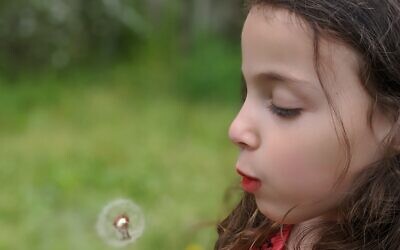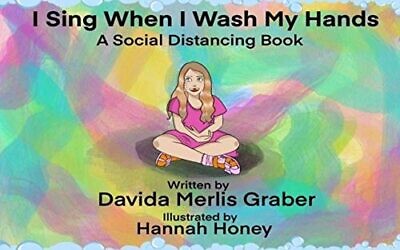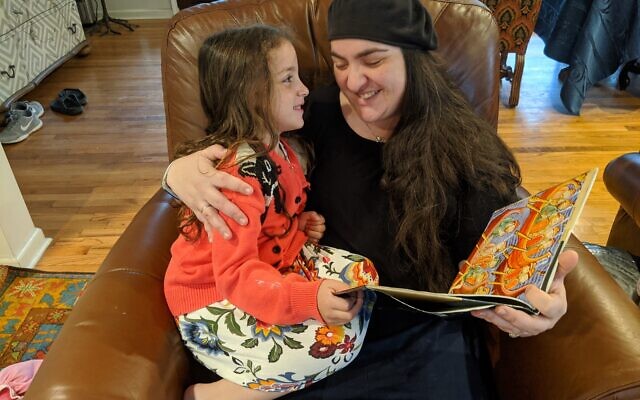Book Helps Kids Share Emotions
A new book helps children learn emotions.
Beth Jacob preschool teacher Davida Merlis Graber was inspired by her own experience working from home with three young children during the global health crisis when she decided to write a book for kids about the experience.
“I Sing When I Wash My Hands: A Social Distancing Book,” self-published March 27, is a children’s book based on her family’s challenges and the need to discuss emotions and feelings while trapped indoors.
“Two weeks ago, on a Friday morning, I had trouble sleeping like a lot of parents who are having trouble sleeping. There’s a lot to worry about: the world, our children, ourselves, our parents.”
Those stressors arise from families trying to adjust to working from home as their children learn alongside them as part of social distancing efforts, according to the educator of 15 years who teaches at the same school she attended as a child.
“These are unusual and challenging times,” said Graber, who continues to teach through Zoom lessons and videos while her infant daughter Gracie, 5, and son Ami, 10, are home. “It’s a challenge to all parents trying to work from home and parenting. I’m balancing motherhood and being a morah [teacher].”
The book includes illustrations based on photos of Graber’s family created by her 14-year-old niece, Hannah Honey Freedman.

The story is told through the eyes of a child during the COVID-19 pandemic with Hannah’s colorful and engaging illustrations and age-appropriate language for young readers, ideally ages 3 to 10, according to the Amazon listing. It is ranked among the top 100 paid through Amazon’s Kindle Store and 124 among children’s social situation books.
Graber, a product of Atlanta Jewish day schools herself, said it took her a week to write the book and publish it, working early in the morning and late in the evening while her children were asleep. She enlisted the help of Freedman because of her experience as a new self-taught digital artist. “While she has been home, she also has been practicing a lot of artwork,” Graber said of her niece.
Once the pair began collaborating on the book, “Hannah worked many hours to get it right. We felt we wanted to provide a resource and wanted it to be timely.”
Before the book was published, a family friend in Israel who learned about it on Facebook, trauma psychologist Naomi Baum, reached out to Graber and agreed to write the foreword.
“Use this book as an opportunity to allow your child to ask questions, and to engage them in further discussion about their feelings, even some of the more difficult ones,” Baum wrote. “This conversation will provide a safe place for children to both identify feelings and express emotions, a skill that is an essential part of growing up.”

Baum hopes to translate the book into Hebrew, Graber said.
“Everybody is in survival mode. Right now we need to be taking care of our children; they need to be our priority and that’s so hard. This book is about opening or even starting the discussion between parents and children about our feelings, social and emotional well-being,” Graber said. “The social part is a challenge because of the distancing. We need to focus on the emotional ways we can cope with changes in our life.”
The book has a positive hopeful message, she said. “It talks about anger and being scared, fear. It’s also about being joyful and hopeful and proud.” The pride is helping keep people healthy, Graber said.
“Everyone is making a sacrifice to help other people, so we should feel proud of the sacrifice we are making to help keep people healthy.”

While the book doesn’t have a Jewish theme because Graber wanted to keep it “accessible to everyone,” she might consider a Jewish version in the future, she said. “In general, it talks about Jewish values and the way we invest in our children and the need to invest in our children emotionally: engaging with children, reading books with children, and making this a special time to make memories around children when we can.”
While a bit older than the target audience, Freedman said she enjoyed working on the book and understood it’s mission “because I, myself, have had a hard time not being able to leave the house and I can’t imagine how hard it must be for young children who really don’t understand what’s going on,” said the student of Temima High School for Girls.
“I hope this book can help kids out there feel like they’re not alone. We’re all in this together.”
“I Sing When I Wash My Hands” is available on Amazon and www.isingwheniwashmyhands.com.




comments